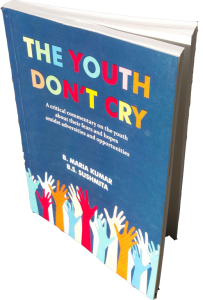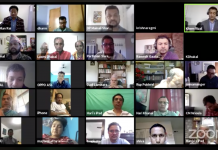Book title: “The Youth Don’t Cry”
Authors: B.Maria Kumar & B.S.Sushmita
Published by: Indra Publishing, Bhopal, India
Reviewed by: Desh Subba
The book, “The Youth Don’t Cry” is interspersed with many inspirational quotes of famous people of the world, all along its read. It is an interesting book for the youth; its presentation is fascinating with formulation of various concepts, literally in terms of mathematical formulae. Book is decorated with many beautiful examples, which were taken from the religions, mythologies and the histories of both the west and the east. It covers the times of Babylonian king Hammurabi as well as of the present and its legends range from Greek mythology to Hindu mythology. It makes easy to understand the color of life and the choice of youth. We can enjoy reading all aspects of the youth- unhappiness to happiness. The youth have problems of depression, stress, weakness, social media addiction and lack of vision. They dream and seek opportunity, goodness and happiness. How to gain and handle them properly has been logically discussed in the book. It also teaches. A sort of clear picture about the role of health, behavior, society, relations, morality, management, environment and economy was presented in the best possible way. When I read, I found pleasure, inspiration and amusement. Examples are concrete and useful in daily life. Characters of Ekalavya, Duryodhan and Arjun represent different life styles as regards their youth. Ekalavya is the self-motivated youth whereas Arjun is inspired and motivated by gurus and Duryodhan is the example of an arrogant, jealousy and wicked youth. Their youth shows the consequences in the future. We can take a lesson from it. How the youth miss golden opportunities in life was illustrated by the examples of Ekalavya and Liddell.
Phaon was a young boatman, who had a boon from Aphrodite, the goddess of love and beauty, to remain young and handsome for ever. Soon, a pretty woman of Lesbos Sappho loved him but he rejected her. Aphrodite made his face and body young and handsome eternally, but left his heart unchanged. The story’s message is that emotions and feelings are superior to physical attributes of beauty.
Invincible Trojan warrior, Tithonus was endowed with eternal life by Zeus. As he grew old, he felt that mere long life without youthfulness had no meaning. Ultimately, he requested Zeus for taking away the boon granted to him.
Achilles was a Greek hero of the Trojan war. His mother Thetis gave him two options; either live a long but an unknown obscure life or a short but glorious life. Achilles chose the latter option. For him, glory matters though life is ephemeral but not uncelebrated life though lengthy.
Example of Motivational Guru is the best about opportunity. What is opportunity? Where does it spring from ? How to gain it? We learn from the best example as narrated by Prakash Iyer, a motivational guru, who shared an amazing lesson in which one speaker whipped out his wallet and pulled out a five hundred rupee note. Holding it up, he asked, ‘who wants this five hundred rupee note.”
Lots of hands went up, including the narrator among the audience. People began to shout, ‘me..me!’. Then a young woman came running down the aisle. She ran up on to the stage, went up to the speaker and grabbed the five hundred rupee note from his hand.
‘Well done, young lady’, said the speaker on mike.
The message is clear. We normally just wait for opportunity. Opportunity is for those who can grab it. It doesn’t come to us; we have to run and grab. We regret saying, “time is not favoring me. I never get opportunity.” It is a big mistake.
Examples of Ekalavya and Liddell show how the youth miss opportunities. Ekalavya once approached master archer Drona, the royal preceptor. He requested Drona to teach archery alongside the Pandavs. But Drona rejected him just because he was not born in the Kshatriya family. Ekalavya missed to learn because of social customs prevailed. Rejection of Drona, of course, couldn’t stop him, he learnt better than Arjun himself.
Eric Liddell was representing Great Britain in 1924 Olympic at Paris but he refused to run 100 meter race because it was held on Sunday and his religious convictions would not allow him to do so on Sabbath. It was a great chance for him to do something for his country. Sabbath stopped him to grab that international opportunity. Practically problem was not Sabbath, but was self-imposed belief. In my view, if we cannot exercise right decision at right time, we can miss many opportunities in life. Liddell could do his Sabbath next time, but Olympic opportunity at that moment never comes back. It is simple example. Many of us might have already faced such problems and let go off golden opportunities.
Story of a widower farmer is an interesting example for educational purpose. We generally tend to disown our wrong doings and put blame on others. Everyone has his share of responsibility in whatever is happening in society, good or bad. His son is killed in a road accident.Behind this incident, there are in fact many factors that are playing their roles invisibly. But what ensues is that the vehicle’s driver alone is normally taken to task.
Six inch long tongue controls six foot-body. It is very important in behavior, discipline and life management perspective. Everything is controlled by tongue. Even impossible work can be done with good tongue and sometimes 100% work can be destroyed by bad tongue. Handling of tongue is very important.
We can learn from the weaknesses of Duryodhan and Achilles for success in life. We often don’t pay attention towards our weaknesses. We falsely think that we are persons without any weakness. One more character is in Puran is Hiranyakashipu, the father of Prahlada. He got a boon from Lord Brahma that he cannot be killed by man, animal, in day and night, by any weapon on the earth or even in the heaven. He thought he is invincible in the universe. The Lord Bishnu found his weakness and killed him. Everyone has weakness; when we find it, we can improve.
There are many useful practical examples that we find in the book. It gives vision, map, enthusiastic spirit to the youth. The youth can choose what is the best way and which is the worst in future and decide on reading it.
I found socioeconomic significance in all chapters. It is the an art of authors. The book gives ideas about youth, parents and teachers. How are they missing the track? Parents and teachers mostly blame on child, but they don’t look their own weaknesses. Wrong doing starts first at home and second in school. Home, school, society and environment are the base of the child. If it is not fertile, then how can grow healthy youth? Everybody trusts that a child is born as clay of pot maker. Pot maker makes pot according to his idea. How to build life/character of child is on the responsibility of child’s parents, teachers, environment and society.
This book also hints some pointers and guidelines to policy makers. I hope it can influence certainly the youth’s life positively and the thinking of parents and teachers too.
















